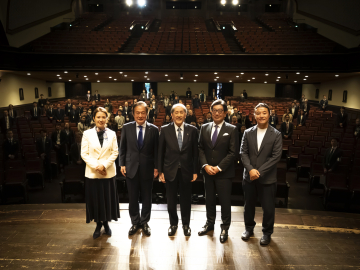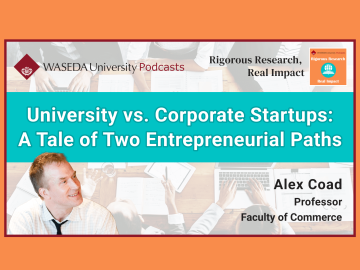Waseda University established the Waseda Research Award in 2014 to promote innovative research at the university and disseminate its results around the world. The award honors scholars spearheading large-scale research projects, as well as emerging researchers whose work has had significant impact abroad. The award has two categories: Large-Scale Research Project and High-Impact Publication. Recipients of the award receive a certificate and a prize of 500,000 yen for the large-scale research project catgory, and 300,000 yen for the high-impact publication category.
Below, we proudly present the recipients of the 2021 Waseda Research Award.
Recipients of the 2021 Waseda Research Award
Large-Scale Research Project Category
*in alphabetical order
- Toshio OHSHIMA
Analysis of Dementia related Microbiome and Biomarkers - Kiyoshi SAITO
Development of Effective Assessment Methodology for Next-Generation Air Conditioning Technology Using Low GWP Refrigerants - Nozomu TOGAWA
Research and Development of a Common Software Platform for Ising Machines - Chiharu TOKORO
Construction of integrated circular production system by product lifecycle management and innovative dismantling technology development
High-Impact Publication Category
*in alphabetical order
Kyoko ISHIDA
Professor Kyoko Ishida has conducted numerous empirical studies from legal perspectives on social issues in Japanese society, including professional ethics of lawyers, access to justice, and gender disparity, and she has been working toward timely dissemination of the results of these studies both in Japan and abroad. In Japan, where submissions to foreign law journals are rare, Dr. Ishida has continued to submit articles to international journals, a rarity in the field of Japanese law, and she has played a central role in various international joint research projects. In addition, by not simply developing prescriptive arguments on a given theme, but also implementing methods for analyzing various statistics, interviews, and other quantitative and qualitative data, she has made previously unseen social consciousness visible and discussable, and has succeeded in creating true depictions of problems in Japanese society, especially when transmitting information to the international community, and this creativity can be evaluated as an excellent aspect of her research.
Masashi OKUBO
Utilizing his knowledge of new materials synthesis, electrode characterization, physical property evaluations, computational simulations, synchrotron spectroscopy and other forms of advanced analyses, Professor Masashi Okubo has made world-leading achievements in the field of materials science for batteries. A primary result from his research over the last five years has been his proposal of a new category of materials for transition metal carbide nanosheets and elucidation of their reaction mechanism, which are expected to contribute greatly to the diversification of battery electrodes in the future. He has also clarified interesting redox reactions of oxide ions in the positive electrodes of lithium-ion and other batteries, providing important suggestions for basic science in this field. Dr. Okubo has been actively promoting collaborative research with universities and research institutes in Japan and abroad, publishing the results in many leading journals. He has invited overseas researchers to international conferences as a session organizer, contributing to the formation of international networks and communities. In view of the above, Dr. Okubo is expected to make significant contributions to the field in the future and is thus deserving of this award.
Alex COAD
Professor Coad’s research focuses on empirical studies on business growth, entrepreneurship, and innovation using firms’ microdata. Despite fierce competition for high-quality analytical data related to research on business growth in recent years, he has built a body of robust empirical studies drawing on a wide range of data. Many of these have been published in leading international journals in their respective fields, including Entrepreneurship Theory and Practice and Research Policy, which are listed in the Financial Times’ top 50 journals. Few researchers internationally have produced studies in these fields at such a prolific pace. He also has an extremely strong international presence through his experience editing Research Policy and Small Business Economics. While industrial organization theory has traditionally argued the importance of market entry and innovation, Professor Coad’s research has contributed valuable findings on the importance of startups growing and changing, and the importance of industry dynamism in terms of the need to effectively innovate after entering a market.
Jack SEDDON
Jack Seddon’s work is highly innovative in looking at the origin, performance and governance of global financial and capital markets. Seddon has carried out exciting research on monetary regimes, central banking, capital markets, and other international financial institutions. It is of first-rate quality and distinctively interdisciplinary, combining approaches in international political economy, economic history, and law.
Seddon’s work is distinguished for combining rational choice and historical institutionalist approaches to unpack different historical dynamics and logics of change – for example, examining and explaining the distinct historical pathways taken by different monetary regimes. Unlike most political scientists that tend to stay away from the study of markets, Seddon’s work also demonstrates that politics is central to understanding markets, both in that markets are political domains of their own governed by internal power relations and also in that power politics arguments are essential to understanding market dynamics and performance.
Since he received his doctorate in 2016, Seddon has published in the very best journals in his field: Perspectives on Politics, International Studies Quarterly (ISQ), and Review of International Political Economy (RIPE). He also has a good number of chapters in edited volumes and in Handbooks.
Seddon’s work is distinguished by his asking big questions and not shying away from difficult explanations. Given the journals in which he has published, one can be sure that the impact of his academic work will be strong in the future.
Yu TAHARA
Dr. Yu Tahara has established “chrono-nutrition” as a new academic field, one that focuses on the science of food and nutrition as it applies to disease and health from the perspective of circadian rhythms, and in doing so has developed several original research projects. Specifically, his research on the relation between circadian rhythms and chronic kidney disease, intestinal microflora, and liver functions has been published in high-impact international journals and, based on numbers of citations, has received worldwide recognition. In response to this international recognition, he has written a review article in Nature Reviews Gastroenterology & Hepatology, and he is working to advance research in the field of chrono-nutrition. He has served as an organizer for symposia related to chrono-nutrition, formed an international research network, and obtained research funding as a representative of that network, and his ability to communicate internationally is highly regarded both at home and abroad. As a young pioneer, Dr. Tahara has thus made significant contributions to the establishment and spread of chrono-nutrition. In the future, he will continue to disseminate research results having even greater impact and giving back to society in a wide range of fields, including the development of innovative foods and medicines and advocacy for new lifestyles.
Michiaki HAMADA
Professor Michiaki Hamada has made remarkable achievements in the field of bioinformatics, particularly related to information analysis of long noncoding RNAs (lncRNAs). Among noncoding RNAs, lncRNAs, which consist of over 200 strands of bases and are not protein-coding, are involved in a wide variety of processes in living cells, and their contribution to the field of drug discovery and medicine has had an extremely large international impact. He developed RIblast, the world’s most powerful RNA–RNA interaction prediction tool, which allows prediction of interactions between lncRNAs and protein-coding RNAs. His numerous other pioneering achievements include combining experimental biological approaches to achieve a world-first elucidation of the molecular mechanism of drug sensitivity in renal cell carcinoma. Dr. Hamada has published numerous papers in major international journals such as Nucleic Acids Research, Oncogene, and Bioinformatics. He has also served as a program committee member for top-class international conferences including the International Conference on Genome Informatics (GIW), the Workshop on Algorithms in Bioinformatics (WABI), and the International Conference on Bioinformatics and Biomedicine (BIBM). He has also actively collaborated with hospitals both in Japan and overseas, leading to the publication of joint research papers, and his research approach is highly competitive and original, making him a world-leading researcher in his field.
Pau PITARCH
Associate Professor Pitarch has been conducting original and in-depth research that is outstanding in quality and quantity in the field of modern Japanese literature. His academic papers and conference presentations in the last five years, mainly focused on Ryunosuke Akutagawa, Haruo Sato and Jun’ichiroTanizaki, have a high degree of originality, and have advanced the field of modern Japanese literary studies in significant ways. He has also contributed to the area with translations of academic papers. It is also important that he is one of the few advanced scholars of modern Japan who is active in Spanish as well as English. His wide range of research activities is surely an advantage for his international network, and should be commended as an important step in the globalization of Japanese studies. Especially, the article on Tanizaki published in Spanish significantly increases the societal impact of Associate Professor Pitarch’s research. His research outcomes and translations have been read widely, which is reflected by the high number of citations he has received. As stated above, Associate Professor Pitarch is doing innovative and first-rate research, and his use of Spanish in addition to English and Japanese, means a very important gain in his ability to broadcast his work, and to call attention to Japanese literature in a much wider international forum than is typical for most international scholars.








